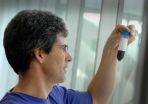(Press-News.org) Boston, Mass. – Through a grant from the Office of the National Coordinator for Health Information Technology (ONC), researchers at Children's Hospital Boston and Harvard Medical School have developed a first-of-its kind platform architecture to support a flexible health information technology (IT) environment and promote innovation. The SMArt (Substitutable Medical Applications, reusable technologies) platform and interface are being made publicly available today to kick off the start of a $5,000 competition challenging developers to create web applications that provide specific functionality for patients, physicians, or for public health.
First described in a March 2009 New England Journal of Medicine Perspectives article, the SMArt architecture is an "iPhone-like" health IT platform model that aims to transform the way health IT supports health care by facilitating the development of medical applications that are scalable and substitutable; that will drive competition, innovation, and increased efficiency in the functionality of technology for improved health care.
ONC awarded $15 million to the project in April 2010 through the Strategic Health IT Advanced Research Projects (SHARP) program. The SMArt project will enable the equivalent of an iTunes App Store for health and support an ecosystem of applications ranging from medication managers for patients at home to e-prescribing applications and decision support for physicians in the office.
"The goal of this model is to enable a substantial shift towards technologies that are flexible and able to quickly adapt to meet the various needs of their users on a variety of devices," said Kenneth Mandl, MD, MPH, of the Children's Hospital Informatics Program and Harvard Medical School, and co-lead on the SMArt project. "As developers begin to compete on quality, value and usability, we expect to see the introduction of an array of innovative functions and a drop in the cost of healthcare technology. Just as staple applications of the iPad, Android, and Blackberry platforms constantly evolve and compete to meet user demands, the SMArt platform will enable health IT to do the same."
In August, Mandl and Isaac Kohane, MD, PhD, also of CHIP, Harvard Medical School and co-lead on the SMArt project, held a SMArt Developer Meeting which included more than 60 representatives from academia, government and business. Multiple prototypes of the SMArt platform were presented and feedback was collected from software developers and the health IT community. Following that meeting, the team built the SMArt platform architecture and interface that is being made publicly available today.
"There is an enormous talent pool available in our country's developers and entrepreneurs to help drive new web and mobile health IT solutions that support health care functions," said Kohane. "Through this competition we hope to excite this pool; to spark their imaginations and partner with them to move new ideas forward."
"Future developments in health IT should always be driven by empowering physicians and improving patient care," said Wil Yu, director of the SHARP program at the Office of the National Coordinator for Health IT.
###
Developers interested in learning more about the SMArt project and/or participating in the SMArt health app challenge may visit www.smartplatforms.org/challenge for complete details and an environment for development. Entrants are eligible to receive an award – $5,000 and release in an "App Store" – for best application.
A panel of industry leaders has been assembled to judge the challenge and will review submitted apps and announce winners in June 2011. Judges will include Susanna Fox, director of Health Research at the Pew Internet & American Life Project; Regina Herzlinger, the Nancy R. McPherson Professor of Business Administration at the Harvard Business School; David Kibbe, senior advisor to the American Academy of Family Physicians and principal at The Kibbe Group LLC; Ben Shneiderman, professor of Computer Science at the Human-Computer Interaction Laboratory at the University of Maryland, College Park; Doug Solomon, chief technology officer at IDEO; Edward Tufte, professor emeritus of Political Science, Statistics, and Computer Science at Yale University; and Jim Walker, chief health information officer at Geisenger Health Systems.
Children's Hospital Boston is home to the world's largest research enterprise based at a pediatric medical center, where its discoveries have benefited both children and adults since 1869. More than 1,100 scientists, including nine members of the National Academy of Sciences, 12 members of the Institute of Medicine and 13 members of the Howard Hughes Medical Institute comprise Children's research community. Founded as a 20-bed hospital for children, Children's Hospital Boston today is a 392-bed comprehensive center for pediatric and adolescent health care grounded in the values of excellence in patient care and sensitivity to the complex needs and diversity of children and families. Children's also is the primary pediatric teaching affiliate of Harvard Medical School. For more information about the hospital and its research visit: www.childrenshospital.org/newsroom.
Harvard Medical School has more than 7,500 full-time faculty working in 11 academic departments located at the School's Boston campus or in one of 47 hospital-based clinical departments at 17 Harvard-affiliated teaching hospitals and research institutes. Those affiliates include Beth Israel Deaconess Medical Center, Brigham and Women's Hospital, Cambridge Health Alliance, Children's Hospital Boston, Dana-Farber Cancer Institute, Forsyth Institute, Harvard Pilgrim Health Care, Hebrew SeniorLife, Joslin Diabetes Center, Judge Baker Children's Center, Massachusetts Eye and Ear Infirmary, Massachusetts General Hospital, McLean Hospital, Mount Auburn Hospital, Schepens Eye Research Institute, Spaulding Rehabilitation Hospital, and VA Boston Healthcare System.
Boston researchers create 'SMArt' platform architecture, launch $5,000 health app competition
Challenge promotes innovation in health information technology
2011-03-09
ELSE PRESS RELEASES FROM THIS DATE:
Research finds open-source software is actually more secure for health care IT
2011-03-09
Globally the sale of health care information systems is a multibillion dollar industry. The vast costs, frequent failed systems, and inability of systems to talk to each other regularly attract media comment. However policy makers still shy away from a class of software, Open Source, that could address many of these problems, because of worries about the safety and security of Open Source systems. Now new research by the University of Warwick's Institute for Digital Healthcare, and the Centre for Health Informatics and Multiprofessional Education at UCL Medical School, ...
Identifying 'anonymous' email authors
2011-03-09
Montreal, March 8, 2011 – A team of researchers from Concordia University has developed an effective new technique to determine the authorship of anonymous emails. Tests showed their method has a high level of accuracy – and unlike many other methods of ascertaining authorship, it can provide presentable evidence in courts of law. Findings on the new technique are published in the journal Digital Investigation.
"In the past few years, we've seen an alarming increase in the number of cybercrimes involving anonymous emails," says study co-author Benjamin Fung, a professor ...
Spanish tourists criticize other Mediterranean countries' lack of hospitality
2011-03-09
People visiting Spain have a high opinion of the price-quality ratio of Spanish hotels. Spanish tourists, on the contrary, complain about the quality of hotels, cleanliness and hospitality in countries such as Italy, Greece and France. This is one of the conclusions of a study carried out by the University of Cádiz (UCA) on tourism in southern Mediterranean countries.
"The five aspects most-highly rated by tourists travelling in the countries of the European Mediterranean are the leisure-spectacle activities, organised routes-excursions, cultural activities, the weather ...
Aging with grace: In-home assessments lead to better care, lower health costs
2011-03-09
INDIANAPOLIS – The March 2011 issue of the journal Heath Affairs highlights an evidence-based model of geriatric care management developed, implemented and tested by researchers and clinicians from Indiana University, the Regenstrief Institute and Wishard Health Services.
Geriatric Resources for Assessment and Care of Elders (GRACE) optimizes the health and functional status of community dwelling lower income, older adults. GRACE is now in use by Wishard Health Services, the third-largest safety-net health organization in the United States; by HealthCare Partners Medical ...
Oops -- graphene oxide's solubility disappears in the wash
2011-03-09
Graphene Oxide has had a scrum of researchers fall upon it as it retains much of the properties of the highly valued super material pure Graphene, but it is much easier, and cheaper, to make in bulk quantities; easier to process; and its significant oxygen content appears to make it soluble in water. However new research led by University of Warwick Chemist Dr Jonathan P. Rourke and Physicist University of Warwick Physicist Dr Neil Wilson, has found that that last assumption is incorrect and unfortunately Graphene oxide's solubility literally comes out in the wash.
Drs ...
The cerebellum provides clues to the nature of human intelligence
2011-03-09
Milan, Italy, 8 March 2011 – Research suggests that intelligence in humans is controlled by the part of the brain known as the 'cortex', and most theories of age-related cognitive decline focus on cortical dysfunction. However, a new study of Scottish older adults, reported in the April 2011 issue of Elsevier's Cortex (http://www.sciencedirect.com/science/journal/00109452), suggests that grey matter volume in the 'cerebellum' at the back of the brain predicts cognitive ability, and keeping those cerebellar networks active may be the key to keeping cognitive decline at ...
MU chemist discovers shortcut for processing drugs
2011-03-09
COLUMBIA, Mo. – A prolific University of Missouri chemist has discovered a quicker and easier method for pharmaceutical companies to make certain drugs.
Jerry Atwood, Curator's Professor and Chair of the Department of Chemistry in the MU College of Arts and Science, has recently published a paper – his 663rd in a refereed journal – that states that highly pressurized carbon dioxide at room temperature could replace the time consuming and expensive methods currently used to manufacture certain pharmaceutical drugs.
In the article, "A New Strategy of Transforming Pharmaceutical ...
Study shows no-till's benefits for Pacific Northwest wheat growers
2011-03-09
This release is available in Spanish.
Wheat farmers in eastern Oregon and Washington who use no-till production systems can substantially stem soil erosion and enhance efforts to protect water quality, according to research by U.S. Department of Agriculture (USDA) scientists.
Agricultural Research Service (ARS) hydrologist John Williams led a study that compared runoff, soil erosion and crop yields in a conventional, intensively tilled winter wheat-fallow system and a no-till 4-year cropping rotation system. ARS is USDA's chief intramural scientific research agency, ...
Right-handers, but not left-handers, are biased to select their dominant hand
2011-03-09
Milan, Italy, 8 March 2011 – The vast majority of humans – over 90% – prefer to use their right hand for most skilled tasks. For decades, researchers have been trying to understand why this asymmetry exists. Why, with our two cerebral hemispheres and motor cortices, are we not equally skilled with both hands? A study from the University of Aberdeen in the UK, published in the April 2011 issue of Elsevier's Cortex (http://www.sciencedirect.com/science/journal/00109452), suggests that the explanation may stem from actions that require us to use both hands at the same time, ...
Boy toddlers need extra help dealing with negative emotions
2011-03-09
URBANA – The way you react to your two-year-old's temper tantrums or clinginess may lead to anxiety, withdrawal and behavior problems down the road, and the effect is more pronounced if the child is a boy who often displays such negative emotions as anger and social fearfulness, reports a new University of Illinois study.
"Young children, especially boys, may need their parents' help working through angry or fearful emotions. If you punish toddlers for their anger and frustration or act as if their fears are silly or shameful, they may internalize those negative emotions, ...
LAST 30 PRESS RELEASES:
Billion-DKK grant for research in green transformation of the built environment
For solar power to truly provide affordable energy access, we need to deploy it better
Middle-aged men are most vulnerable to faster aging due to ‘forever chemicals’
Starving cancer: Nutrient deprivation effects on synovial sarcoma
Speaking from the heart: Study identifies key concerns of parenting with an early-onset cardiovascular condition
From the Late Bronze Age to today - Old Irish Goat carries 3,000 years of Irish history
Emerging class of antibiotics to tackle global tuberculosis crisis
Researchers create distortion-resistant energy materials to improve lithium-ion batteries
Scientists create the most detailed molecular map to date of the developing Down syndrome brain
Nutrient uptake gets to the root of roots
Aspirin not a quick fix for preventing bowel cancer
HPV vaccination provides “sustained protection” against cervical cancer
Many post-authorization studies fail to comply with public disclosure rules
GLP-1 drugs combined with healthy lifestyle habits linked with reduced cardiovascular risk among diabetes patients
Solved: New analysis of Apollo Moon samples finally settles debate about lunar magnetic field
University of Birmingham to host national computing center
Play nicely: Children who are not friends connect better through play when given a goal
Surviving the extreme temperatures of the climate crisis calls for a revolution in home and building design
The wild can be ‘death trap’ for rescued animals
New research: Nighttime road traffic noise stresses the heart and blood vessels
Meningococcal B vaccination does not reduce gonorrhoea, trial results show
AAO-HNSF awarded grant to advance age-friendly care in otolaryngology through national initiative
Eight years running: Newsweek names Mayo Clinic ‘World’s Best Hospital’
Coffee waste turned into clean air solution: researchers develop sustainable catalyst to remove toxic hydrogen sulfide
Scientists uncover how engineered biochar and microbes work together to boost plant-based cleanup of cadmium-polluted soils
Engineered biochar could unlock more effective and scalable solutions for soil and water pollution
Differing immune responses in infants may explain increased severity of RSV over SARS-CoV-2
The invisible hand of climate change: How extreme heat dictates who is born
Surprising culprit leads to chronic rejection of transplanted lungs, hearts
Study explains how ketogenic diets prevent seizures
[Press-News.org] Boston researchers create 'SMArt' platform architecture, launch $5,000 health app competitionChallenge promotes innovation in health information technology



